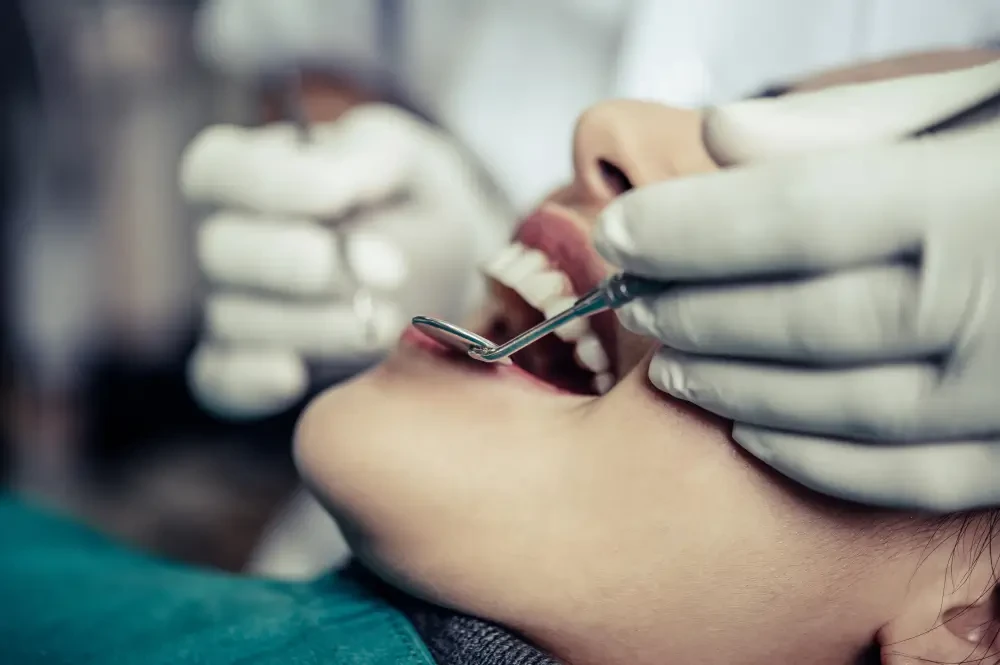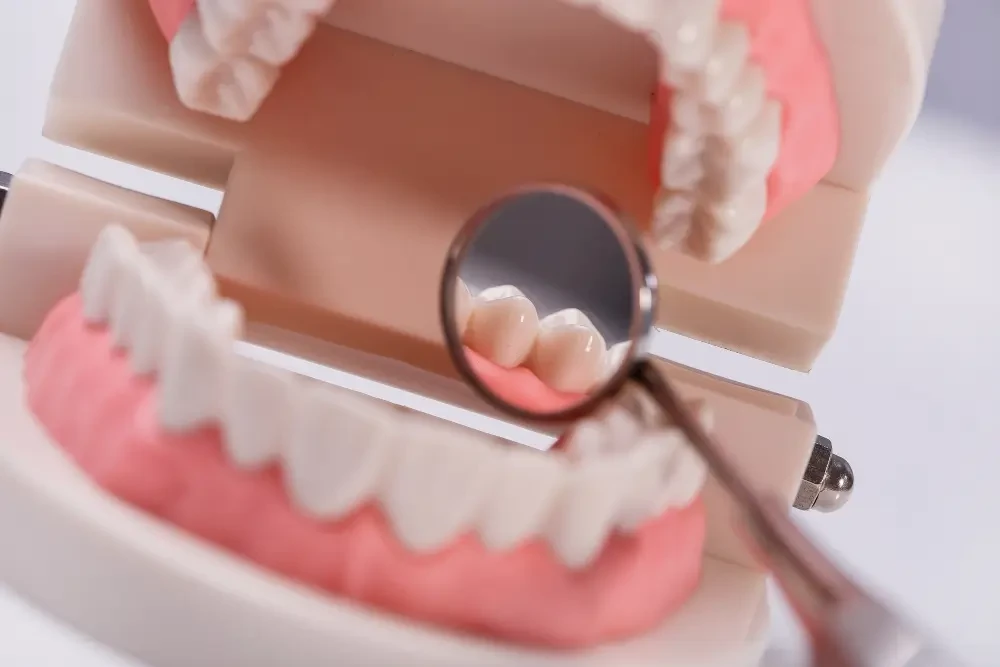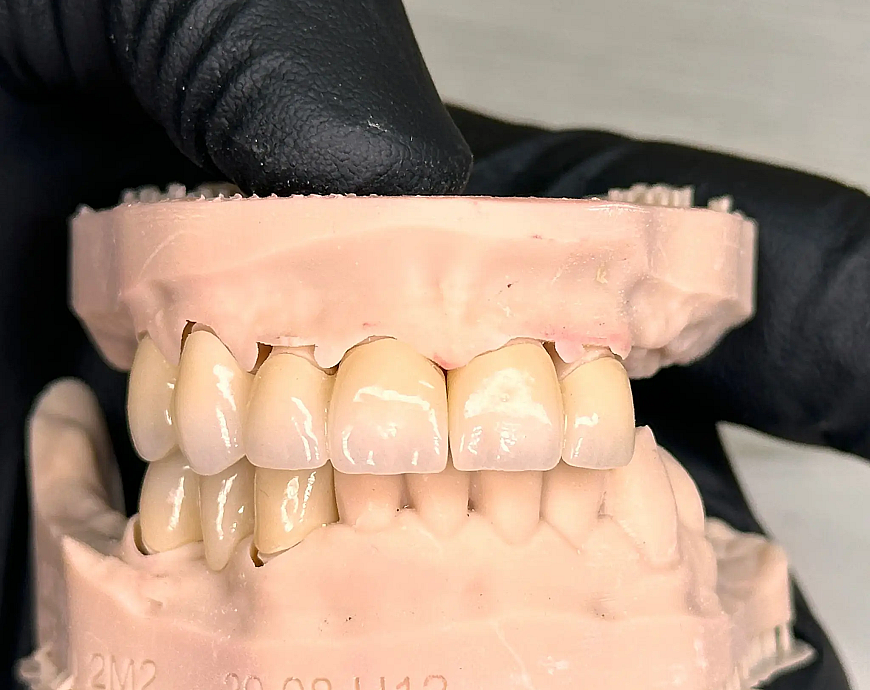Dental crowns, necessary to protect teeth that have been weakened by extensive carious processes, endodontic treatments or fractures, respectively to cover implants, are prosthetic works that prevent further damage to the teeth and help patients fully regain their ability to eat and speak correct. There are various types of dental crowns used in medical practice, but those made of zirconia stand out due to the multiple advantages offered. The use of zirconium crowns is recommended for people of all ages who require prosthetic treatment, regardless of the causes that led to tooth damage.
What is a zirconia dental crown?
A zirconia dental crown is a device used in dental prosthetics treatments to cover or protect a damaged tooth or to cover a dental implant to complete implantology treatment. The material from which it is made is specific to the zirconium crown: zirconium, with high durability, compatible with oral tissues.
Types of zirconium dental crowns
Zirconium dental crowns fall into several categories, each with specific characteristics that influence their clinical use. Among the most famous are:
- monolithic zirconium crowns, known for their hardness;
- ceramic crowns on a zirconium support, obtained by the layered technique, which offer superior aesthetics, because they almost perfectly imitate the natural appearance of the teeth;
- zirconium crowns with increased translucency, used in the frontal area, due to their ability to imitate the shine and transparency of natural teeth.

When and to whom is a zirconium dental crown recommended?
Zirconium dental crowns are recommended in several clinical situations, depending on the needs and preferences of the patient. Used to restore teeth that have suffered extensive damage due to caries or fractures, zirconia crowns can also be suitable for patients who need crowns on dental implants due to their strength and biocompatibility.
Zirconia crowns are particularly suitable for restorations in the frontal area, but also in the posterior area. Last but not least, dentists recommend zirconium crowns to people with metal allergies who would normally opt for metal crowns.
In order to accurately determine whether a dental work made of zirconia is suitable in a certain clinical context, a dental consultation appointment and an assessment of the individual situation are always required.
Zirconium dental crown: Advantages and Disadvantages
In over 90% of cases, zirconium dental crowns are the right choice, with the long-term benefits significantly outweighing any potential risks or disadvantages. Durable and effective, zirconia crowns can provide both aesthetic and functional improvements.
The advantages of the zirconium dental crown
Zirconium crowns are wear-resistant, so they can be used for years without cracking or fracturing, even under heavy wear. In addition to the advantage of durability, zirconium crowns adapt very well to the structure of the prepared tooth, a property that allows precise cementation and implicitly the significant reduction of the risk of bacterial infiltration and the appearance of secondary caries.
Another major advantage is the biocompatibility of zirconium, a material that does not cause allergic reactions and does not irritate the oral tissues, being very well tolerated by the body. Superior esthetics is also an important benefit of zirconia crowns, which can be tinted to perfectly match the shade of natural teeth.
Disadvantages of the zirconium dental crown
Despite the many advantages, dental crowns, like any other dental treatment, also have some disadvantages. One of the main disadvantages, specific to zirconium crowns, is the high cost, which can become a limiting factor for some patients. The increased cost is due to both the material itself and the advanced technology required to manufacture and fit zirconium crowns.
Another disadvantage is the difficulty in adjusting zirconium crowns after cementation. Zirconium is a very hard material, which makes adjustments more complicated and requires special equipment. In the rare cases where changes are needed after fitting, the procedure can be more difficult than with other types of crowns. Also, zirconium crowns, although very durable, can sometimes cause abrasion on opposing teeth, especially if they are not properly finished.
Finally, there are cases where zirconium crowns can fail or fracture under extreme stress or due to incorrect application. However, such cases are rare, if the application of dental crowns is carried out by a specialist in dental prosthetics.

The stages of applying a zirconium dental crown
Prosthetic treatment always begins after establishing the patient's needs, so after a complete examination of the affected tooth or teeth. Thus, during the first dental consultation, the doctor will examine the affected tooth and, based on physical and imaging investigations, will determine the degree of damage and decide if a zirconium dental crown is the right solution.
After establishing the treatment plan, the actual preparation of the tooth proceeds. Under local anesthesia, the doctor removes damaged or decayed tooth structures and shapes the tooth to create adequate space for the zirconia crown. Precise shaping ensures effective cementation and a perfect fit of the crown, preventing any subsequent problems.
After preparing the tooth, a dental impression is made, using impression materials or digital intraoral scanning technology. The dental impression serves as a template for the dental technician in the fabrication of the crown to ensure a proper fit to the patient's individual tooth structure and correct occlusion with the opposing teeth.
Until the definitive crown is completed, the doctor applies a temporary crown made of acrylic or composite material to protect the prepared tooth and maintain the functionality and aesthetics of the treated area. The temporary crown prevents tooth sensitivity and allows the patient to continue their daily activities without major discomfort.
Once manufactured, the zirconium crown is tried in the patient's oral cavity. The doctor checks the fit, color, shape and occlusion, before the final cementation of the crown. After the fit is confirmed, the zirconia work is permanently attached to the tooth using a dental cement. Finally, the doctor removes the excess cement and rechecks the occlusion to ensure that the crown application process has been completed successfully.
How much does a zirconium dental crown cost - Price
The cost of a zirconia dental crown can vary depending on the complexity of the case, the need for additional procedures, the technology used to manufacture the crown and the costs applied by the clinic. In general, zirconium crowns cost more than other types of crowns due to the high quality material and advanced manufacturing process involved.
| Dental services | Price RON |
| Full zirconia crown | 1200 |
| Ceramic crown on Zirconium support | 1600 |
| Zirconium-ceramic crown on the implant | 1700 |
| Ablation per crown | 100 |
How durable are zirconia dental crowns?
Zirconium dental crowns are renowned, among other things, precisely for their exceptional durability, being some of the most durable options available in dentistry. Zirconium is a very hard ceramic material that can withstand intense masticatory forces, being used for both front and back dental restorations. In addition to high durability, zirconium crowns are extremely resistant to wear, cracking and fracture, with a long service life if properly maintained.
Zirconium crowns VS other types of crowns
Despite the numerous advantages offered, zirconia crowns are not, at the moment, the most frequently used types of dental crowns in dental practice. Metal crowns, along with metal-ceramic ones, are commonly used in dental restorations, especially due to their lower costs and high durability.
Zirconia dental crown vs metal dental crown
Metal dental crowns are prosthetic restorations made from various metal alloys, traditionally used to cover and protect damaged teeth in the back of the mouth. In dentistry, metal crowns were among the first prosthetic restoration options due to their characteristics. The main difference between metal and zirconium crowns is determined by their appearance. Metal crowns are not esthetic, so they are not suitable for front teeth. In contrast, since they can perfectly imitate the color and transparency of natural teeth, zirconium crowns are chosen for restorations in the frontal area.
Zirconium dental crown vs acrylic dental crown
Acrylic crowns, although less expensive, are often used as temporary solutions because they have much less strength and can damage or stain more easily over time compared to zirconia or metal crowns. Also, acrylic crowns do not offer the same level of biocompatibility and can cause, but only in limited cases, gingival irritation or allergic reactions.

How to maintain a zirconium dental crown
Although zirconia teeth are very durable and have little tendency to discolor or stain, they still require proper care to prevent dental problems. Daily oral hygiene is fundamental. As before the placement of the dental crown, it is necessary to brush the teeth at least twice a day, preferably in the morning and in the evening, using a fluoride toothpaste. Flossing is also important to clean the spaces between the teeth, including around the crown, where food debris can collect.
It is important to avoid harmful habits, such as teeth grinding or chewing on hard objects, which could lead to cracking of the crown. For people who suffer from bruxism, it is recommended to wear a mouth guard at night to protect the zirconium crown. It is also recommended to visit the dentist regularly, usually at six-month intervals, to check the integrity of the crown.
Frequently asked questions about zirconia dental crowns
Is the application of zirconia crowns painful?
The application of dental crowns, regardless of their type, whether they are metal, zirconium or ceramic, is generally not a painful procedure, thanks to the use of local anesthesia. During tooth preparation, the dentist will remove some of the tooth enamel, which could cause discomfort if no anesthesia was administered. Later, during the actual mounting of the dental crown, there is no discomfort. A slight local pain may occur post-procedurally, but its intensity is reduced and the manifestation period of only a few days.
Do zirconium dental crowns yellow over time?
Dental crowns made of zirconium have a very good resistance to stains and discoloration, thanks to the natural properties of the material. Zirconium does not react with foods and drinks that could cause yellowing. However, in order to protect the natural teeth, it is necessary to continue brushing regularly.
How often should I visit the doctor if I have zirconium dental crowns?
Follow-up examinations after the application of zirconium crowns, necessary to check the integrity of the crown and the general state of oral health, should be carried out at intervals of 4-6 months, depending on the recommendations of the dentist. Medical control is also required in the event of pain or other oral problems.
What should I expect after the procedure of applying zirconia dental crowns?
After the procedure of applying dental crowns, it is normal to experience a slight sensitivity to heat or cold, at least for the first few days. Sensitivity to extreme temperatures is temporary and is due to the adaptation of the tooth and gum to the new structure. Also, in the first hours after the procedure, it is recommended to avoid eating very hard or sticky foods, to allow the cement to harden completely. In rare cases, small masticatory problems may occur, which the dentist can easily correct.

Dr. Nicoleta Taran answers questions:
+40787877799
contact@dentarbre.comZona Obor - Colentina - Doamna Ghica, București, Romania
